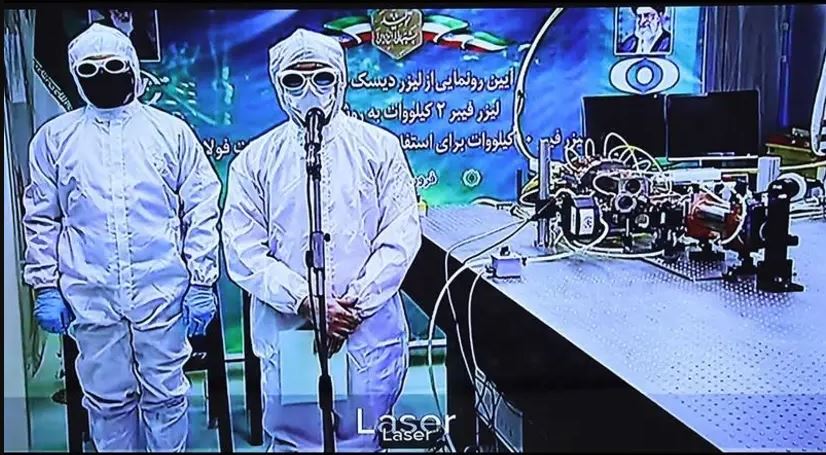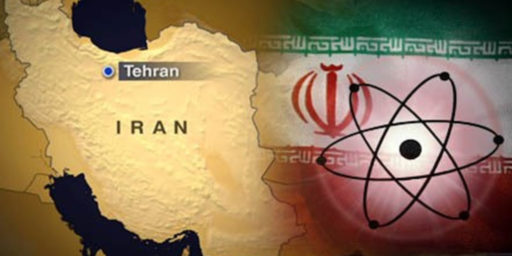Natanz Bombing More Effective Than Thought
Thousands of centrifuges have been destroyed.

While it’s very much a back burner story in the American press, the Israeli media is having a field day with the bombing of the Iranian nuclear facility at Natanz. Despite early reports that it was a cyber attack, it was almost certainly a bomb. And it did much more than some temporary damage to the power grid.
Jerusalem Post (“Natanz attack hit 50 meters underground, destroyed most of the facility“):
The alleged Israeli attack on Iran’s Natanz nuclear facility targeted an electrical substation located 40 to 50 meters underground and damaged “thousands of centrifuges,” Iranian officials revealed in recent days.
Fereydoon Abbasi-Davani, former head of Iran’s Atomic Energy Organization, told Iranian media on Monday that the attack hit an electrical substation located deep underground and managed to damage both the power distribution system and the cable leading to the centrifuges in order to cut power to them.
The Iranian official stressed that such an operation takes years, saying “the design of the enemy was very beautiful.”
Davani added that the substation was built underground in order to protect it from air and missile strikes, and that the attack was carried out either via cyber, sabotaged equipment or sabotage committed by agents.The Jerusalem Post has learned that the attack was carried out through an explosive device that was smuggled into the facility and detonated remotely. An intelligence official told The New York Times on Tuesday that the attack took out both the primary and backup electrical systems.
Davani confirmed on Monday that the attack last July was also carried out with explosives that were smuggled into a centrifuge assembly facility at the site, with the explosives embedded in a heavy table that was brought into the facility.
Ali Rabiei, the spokesperson for the Iranian government, stated on Tuesday that the attack was “not an external attack” and that a “traitor” has been identified, adding that “the necessary measures are being taken.”
[…]
Alireza Zakani, head of Iran’s Parliament Research Center, announced in a television interview on Tuesday that “thousands of centrifuges” had been destroyed, damaging “most of the enrichment facilities.”
Zakani additionally claimed that some equipment had been sent abroad and “returned with 300 pounds of explosives,” and that explosives had been placed inside a desk, similar to Davani’s claim about the attack in another facility at Natanz last July.
The parliamentarian expressed outrage that the attack had succeeded and called for uranium enrichment to be increased to 60% in response.
Considering multiple reports that the Iranians are vowing revenge on Israeli, and have even mounted some minor attacks, I’m skeptical that it was an inside job, although it’s certainly possible that Mossad recruited an asset.
Prime Minister Netanyahu’s predecessor offers an interesting possibility, as reported by the Times of Israel (“Olmert says Iran Natanz bomb could have been planted 10-15 years ago“):
Former prime minister Ehud Olmert said Tuesday that a bomb that caused severe damage at Iran’s Natanz nuclear enrichment facility was likely placed there more than a decade ago, waiting for the right time to be detonated.
While specifying repeatedly that he had no direct knowledge of the operation, or who was behind it, Olmert said such an attack would have been the fruit of long-laid plans. He also slammed Prime Minister Benjamin Netanyahu, blaming him for a series of leaks to Israeli and foreign media that attributed the strike to Israel’s Mossad spy agency.
Iranian officials on Tuesday confirmed that the blast at the site caused significant harm, damaging or destroying thousands of centrifuges. Iran has blamed Israel, calling the attack an act of “nuclear terrorism.”
“I don’t know what happened there, who set it off, if it was planted in that year or another, 10 years ago or 15, I don’t know,” Olmert told the Ynet news site in an interview. “If these things happened, I can think of all sorts of operations that could have caused this, and it is possible the foundations for this were laid a long time ago.”
Olmert was prime minister between 2006 and 2009, famously overseeing Israel’s bombing of a Syrian nuclear reactor. The development of the Stuxnet virus that attacked Iran’s nuclear program and has been blamed on Israel and the US, was also reportedly developed during his time in office.
“These kinds of missions, whether we carried them out or not, are not ‘somebody broke in two nights ago and planted things there.’ These things happen when all sorts of machines, long before they are even installed, they are already booby-trapped and waiting for the right time,” Olmert said.
The timing is obviously self-serving but it’s certainly quite plausible.
New York Times (“Iran Vows to Increase Uranium Enrichment After Attack on Nuclear Site“) adds:
Iran said Tuesday that it would begin enriching uranium to a level of 60 percent purity, three times the current level and much closer to that needed to make a bomb, though American officials doubt the country has the ability to produce a weapon in the near future.
Deputy Foreign Minister Seyed Abbas Araghchi, Iran’s top nuclear negotiator, did not give a reason for the shift, but it appeared to be retaliation for an Israeli attack on Iran’s primary nuclear fuel production plant as well as a move to strengthen Iran’s hand in nuclear talks in Vienna.
The Israeli attack on Sunday diminishes Iran’s capacity to enrich uranium to 60 percent but it is unclear for how long.
Mr. Araghchi said that Iran had informed the International Atomic Energy Agency of its decision in a letter on Tuesday.
Iran also attacked an Israeli-owned cargo ship off the coast of the United Arab Emirates on Tuesday, officials said, the latest clash in its maritime shadow war with Israel. The attack was another sign of increased tensions in the region but was reported to have caused little to no damage.
The effects on the nuclear deal remain to be seen. Israel has been adamantly opposed to negotiations and saw JCPOA as kicking the can down the road and endangering their security. And, since anything the Israelis do is likely to be perceived by Iran as having our blessing, if not our active cooperation, this ay increase resistance to returning to the table.






Well, that was the point of the bombing, I’m sure. Biden wants to revive the JCPOA and suddenly things go boom.
But it’s not just about the perceived approval of the US. Iran has internal politics, too. This strengthens the hand of the hardliners who want security against any outside threat.
So what Israel has been doing is deliberately undermining US foreign policy.
While that is not problematic in itself (sovereign nations, and all that), it is rather strange that a nominal client, who receives billions in military aid every year, feels (correctly, I assume) that it can get away with it.
We are Israel’s client state now. If you look at it that way this makes sense. Israel has gotten used to getting whatever it wants from us.
Steve
Iran certainly has a security problem, one would think that should be job 1 for them.
Israel wants Iran destroyed, but can’t defeat Iran, short of using its own nukes, it simply doesn’t have the logistical capability to do so. Neither can Iran defeat Israel, but through its allies, it can make the Israelis uncomfortable. The US interest (and most of the world’s interest) is keeping Iran from getting nukes. A US military option has been considered and put aside by several administrations, with diplomacy and negotiation being the preferred path to solution and that was also so under the Former Guy.
Israel wants to push the US into a military confrontation with Iran, but they don’t seem to appreciate that as much as the US wants to keep the an Iranian nuke threat in a bottle, the US has a perfectly good fallback position of deterrence, to use against a nuclear Iran. Biden isn’t going to war with Iran and there are no Dems who will and outside of Pompeo and Cotton, I don’t believe any R presidential candidates would start a war.
We and the Israelis have the same goal: to stop Iran getting nukes. The goal is not the treaty, or the treaty talks, the goal is stopping an Iranian nuke. So at the strategic level, this works just fine for us. Tactically it may (or may not) be disturbing.
@Michael Reynolds: Well, there is the argument that Iranian policy makers become more determined to achieve Nuke-status with each setback.
I have no opinion about that. My first reaction was like yours: ‘The Israelis did our work for us.’ My second reaction was to worry that the opposite is true.
@JohnMcC:
My sense is that Iran is like Israel in that the political factions break down as hard-ass motherfuckers on the one hand, and harder-ass m’fers on the other, and both want nukes. Any time an American thinks he’s going to cleverly manipulate a Persian by playing factions against each other, I have to laugh.
They don’t want to go down like Saddam, and they are determined to be what they naturally are: a major regional player. We need to find a way to let that happen without letting them have nukes.
@drj:
Most likely this. It’s telling that this bombing just happened to coincide with U.S. Secretary of Defense Lloyd Austin visit to Israel (I believe he was in Isreal when this happened). So even if we were not given forwarning or asked for approval, the timing sure made it look like we were complicit.
If a Russian client state, say Syria, had snuck a bomb into one of our nuclear plants and blew it up, what would we be doing right now?
I wonder how an actual US withdrawal from Afghanistan will impact all this. When I pull up my map of Asia, I can’t help but notice that the US is currently more or less occupying two countries that border Iran on one side and the other. I doubt that has escaped anyone’s attention. Nor would leaving one of those countries have no impact.
@Joe:
With only ~3500 troops in Afghanistan, our ability to effect what happens in that country is marginal and really has no effect on Iran. The Taliban and Iranians are not particularly friendly, though they have had a the enemy of my enemy relationship in recent years. But we can expect the hostility to return when the Taliban return to power.
The US cudgel over Iran is air and sea power, we don’t have enough troops there to make a difference. But do have the ability to ramp that up in a few months if necessary and the Iranians know that.
@Michael Reynolds:
This would arguably be an easier proposition to accomplish if we took the blatant hypocrisy of Israeli nukes off of the table. Steve is quite correct – Israel has artfully used the specter of US political blowback to achieve a situation where it can basically do whatever it wants and the US is the client state powerless to stop it from doing so.
@Stormy Dragon: It’s completely different. That would be an attack against us whereas this is an attack on them. No similarity at all.
@Michael Reynolds:
We have a broader goal: Keep middling powers from believing that they need nuclear weapons to protect their security.
If Iran was a nuclear power, the Israelis would be more hesitant to blow things up there, and we we would be more hesitant to launch airstrikes. While they are pursuing nuclear weapons, we are more likely to attack.
Meanwhile North Korea gets to act out and we do nothing. They’re even developing missile technology. But we don’t want to pay the price of going to war with a nuclear power.
This sends a clear message to Iran: get the nuclear weapons quickly.
It also sends a message to … oh Syria, Serbia and Sudan: Get nuclear weapons quickly, and quietly.
We need to have a way to guarantee the security of nations that don’t have nuclear weapons. That’s our strategic goal. And that means we want to succeed with Iran through negotiation, not just blowing shit up.
(The Libya intervention was a mistake, and should not have happened)
@Sleeping Dog:
Bolton must have been so angry he didn’t get his war with Iran.
Anyway, recent history shows that assuming Republicans will be mostly reasonable and not nominate a nutjob is a poor assumption.
Can Marjorie Taylor Greene run for president? Yup, she’s 46. Are we sure she wouldn’t get the nomination, and then get elected? Really sure?
At least the Greene Administration will reign in our relationship with Israel, over the contentious issue of Jewish Space Lasers setting wildfires in the US.
(Note: I would grudgingly approve of Biden launching an airstrike against her nominating convention, but would insist that he be impeached and convicted)
@HarvardLaw92:
Yep. The tail is wagging the dog, not the other way around. (Anyone with teen-age children will recognize the position we’re in.)
@Michael Reynolds:
Indeed… 😀
From the one quoted article:
From another:
This is just such a nice detail.
I like to think that 10-15 years ago, Israel was just selling explosive tables on Craigslist, with little GPS trackers, waiting to see if one found its way into the site. They can also blow up every dormitory and young college kid’s apartment throughout the middle east.